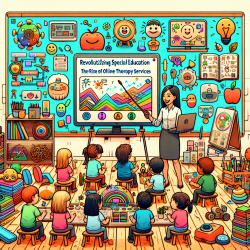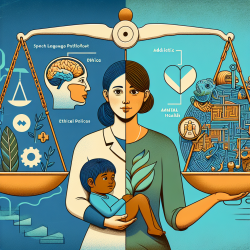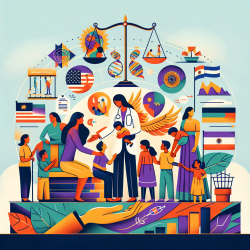As the landscape of special education evolves, educational psychologists find themselves at the forefront of an intriguing transformation. The integration of technology in therapy services is not just a fleeting trend; it's a robust solution to the ever-growing needs of children requiring specialized support. TinyEYE, a pioneer in online therapy services, stands as a beacon in this digital revolution, offering a seamless bridge between expertise and accessibility. This article aims to explore the burgeoning realm of online therapy and its implications for special education, urging educational psychologists to consider the potential benefits and take the next step towards embracing this innovative approach.
Traditionally, special education has been challenged by the scarcity of resources, particularly in remote or underserved areas. Children with diverse needs often faced barriers to receiving timely and effective therapy. However, the advent of online therapy services has shattered these barriers, opening a new chapter where every child can access the support they need, regardless of their geographical location.
At the heart of this paradigm shift is the principle of inclusivity. Online therapy services, such as those provided by TinyEYE, ensure that children in special education are no longer marginalized due to a lack of local resources. Educational psychologists, as advocates for the mental, emotional, and educational well-being of these children, are now equipped with a tool that transcends traditional constraints, offering tailored therapy that aligns with each child's unique learning profile.
Online therapy is not a mere substitute for in-person sessions; it's a dynamic platform that leverages multimedia and interactive tools to engage children in a virtual environment. These digital therapy solutions cater to various learning styles, making therapy sessions more engaging and effective. The multi-sensory approach used in online therapy aligns with the principles of universal design for learning, ensuring that all children, regardless of their abilities, can benefit from the therapy provided.
Educational psychologists are continually seeking evidence-based practices to support their interventions. The data-driven nature of online therapy services allows for meticulous tracking of a child's progress, providing valuable insights that inform treatment plans. TinyEYE's platform, for example, offers real-time progress monitoring, enabling therapists and educators to make informed decisions and adapt strategies to maximize outcomes for children in special education.
Collaboration is a cornerstone of effective special education. Online therapy facilitates seamless communication between therapists, teachers, and parents, fostering a cohesive support network for the child. This collaborative environment not only enhances the therapy experience but also empowers all stakeholders to contribute actively to the child's development. Educational psychologists can leverage this interconnectedness to advocate for the child's needs and ensure that interventions are consistent across all environments, from the classroom to the home.
Professional development is a critical aspect of maintaining high standards in therapy services. Online platforms provide educational psychologists and therapists with access to a wealth of resources and training opportunities. This continuous learning environment ensures that the professionals involved in special education are well-equipped with the latest methodologies and technologies to support their practice.
As the world embraces digital transformation, concerns about the digital divide and equitable access to technology are valid. TinyEYE addresses these concerns by partnering with schools to ensure that all children, regardless of socio-economic status, have access to high-quality online therapy services. By bridging the digital gap, educational psychologists can be assured that the benefits of online therapy are within reach of every child in need.
One cannot overlook the cost-effectiveness of online therapy. By reducing the need for travel and physical infrastructure, schools can allocate their resources more efficiently, ensuring that funds are directed towards enhancing educational outcomes. This fiscal responsibility is especially critical in special education, where resources are often stretched thin. Educational psychologists can advocate for online therapy as a sustainable option that maximizes the impact of every dollar spent on special education services.
Despite the clear advantages, transitioning to online therapy requires a shift in mindset. Educational psychologists, being agents of change, play a pivotal role in this transition. By fostering a culture of innovation and openness to new approaches, they can pave the way for the successful integration of online therapy into special education curricula.
The potential of online therapy in special education is vast, but it is the action taken by educational psychologists that will determine its trajectory. As digital natives, today's children are primed to embrace online learning environments. It is incumbent upon us, the stewards of their education, to harness the power of technology to provide them with the best possible support.
In conclusion, online therapy services such as TinyEYE's are not just a fleeting innovation but a fundamental shift in the delivery of special education. They promise a future where every child has access to the support they need to thrive. Educational psychologists are invited to explore this digital frontier with curiosity and take the next step towards incorporating online therapy into their practice. The time is ripe to revolutionize special education, and online therapy is the key to unlocking a world of possibilities for children in need.
Are you ready to take the next step and explore the transformative power of online therapy? Reach out to TinyEYE to learn more about how our services can enhance your practice and enrich the lives of children in special education. Together, we can build a future where every child has the opportunity to reach their full potential.










